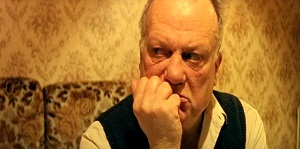4/5
Two all-american surfer buddies (Michael Hynson & Robert August) come up with an ambitious idea of traveling around the world, following the warm summer climate so that they can create an idealistic "Endless Summer", optimized to create superior surfing conditions for them.
In the late 1960's there weren't Go Pro cameras. If you wanted to shoot an adventure documentary you used 16mm film. Bruce Brown, a surfer himself, puts himself close to the action and captures some really wonderful surfing with the backdrop of various Equatorial paradises. He also narrates the film, and adds a Bob Hope-esque light-hearted comedic tone that really adds to the innocent nature of it all. When the duo travels to Africa, the natives have never even SEEN a surfboard before. What follows is quite heartwarming... literally pulling panels off of their homes so they can attempt to surf along with them on makeshift boards. A good example of cross-culture pollination. It's a very heartening look at humanity, different cultures coming together even in times of political unrest. Most people wouldn't want to travel to Africa in the 1960's, let alone swim in the shark-infested waters. Hynson and August are clearly courageous and obviously in a deep love with their sport. Another notable shot is when the two travel to South Africa, they motivate the hundred native surfers to take the day off of work to go surfing with them. What follows is a memorable shot of several Volkswagen Beetles navigating the rocky S curves, with surfboards tied to the roof.
It's an insightful look back in time, when the sport of Surfing was completely untarnished. There were no pretenses. It was long before the surfing cliches were established (although I DID hear a "Hang Ten" when they were in Africa). The salad days of surfing are gone. Now, the contemporary surfer-dude cherishes his copy of The Endless Summer like it's a sacred scripture, just like the 300 lb. firefighter locks away his treasured copy of Backdraft in his fire-safe next to his wedding photos. Their nostalgic ode. Paying tribute to the paragon. I suppose you can't fault people for looking back at someone or something and holding it in high regard when it was in its purest form. Surfing is just another example of something that isn't what it was fifty years ago, but fortunately those classic days were captured on film.
















